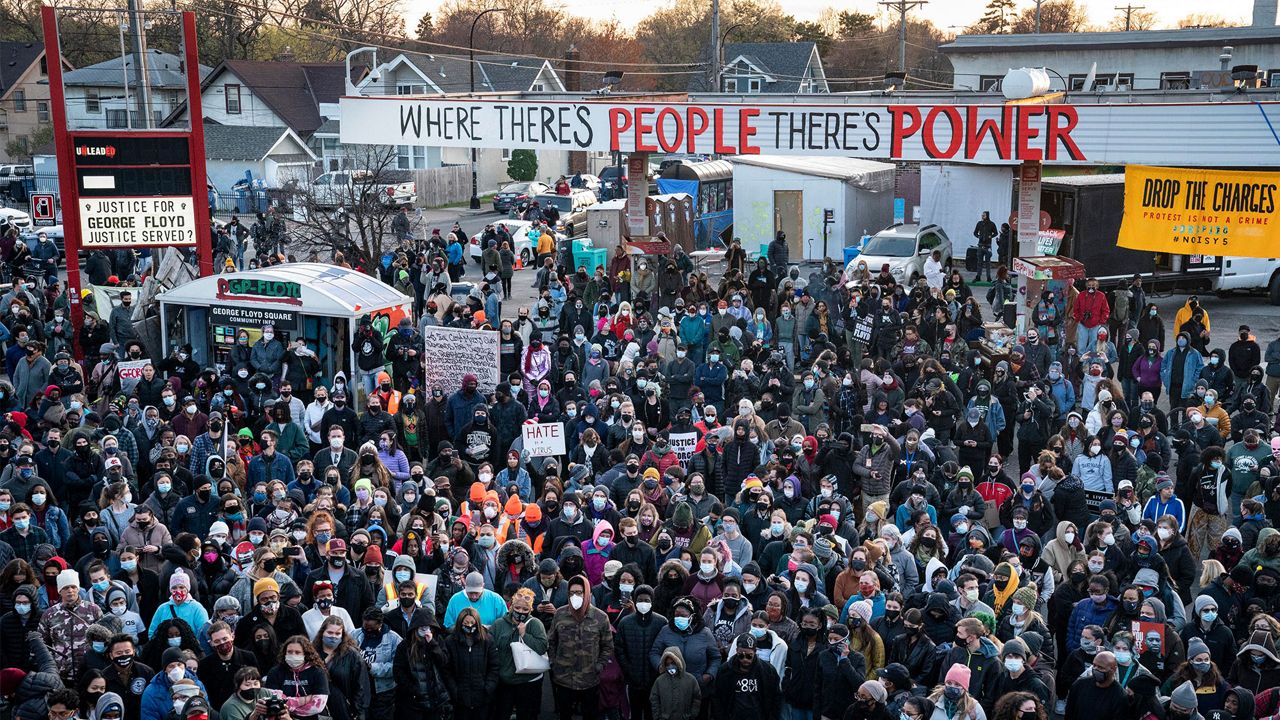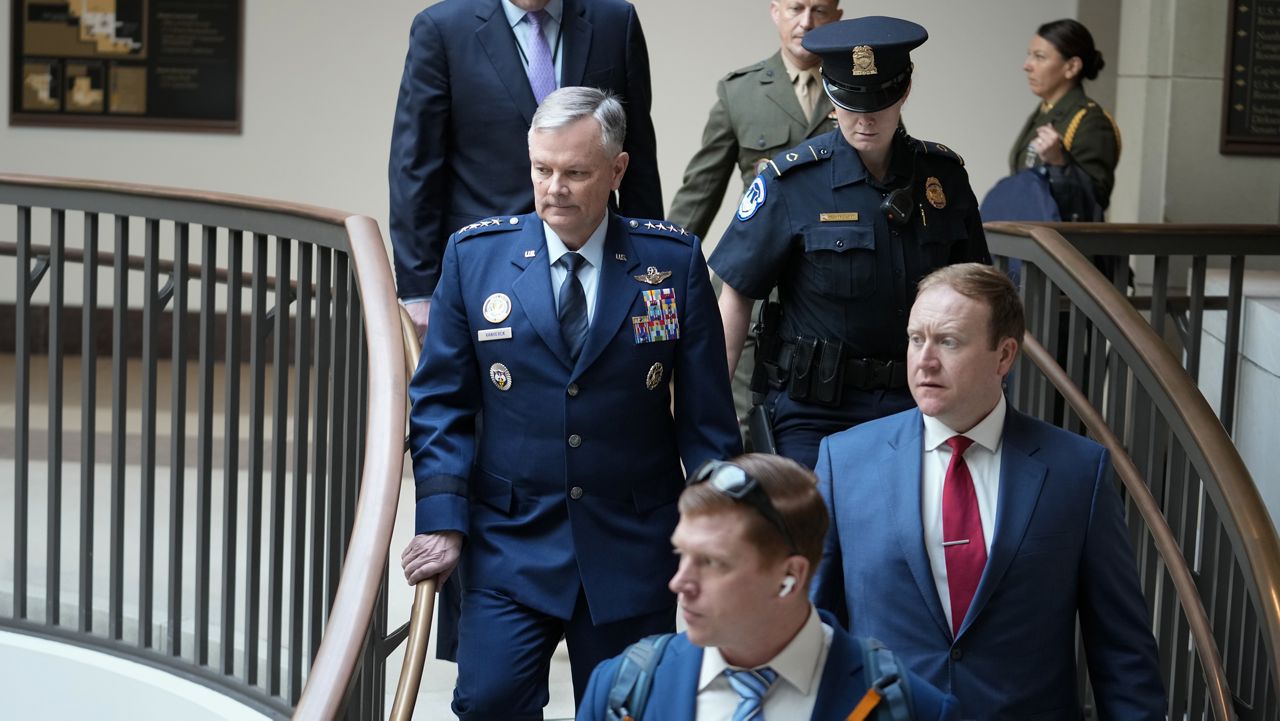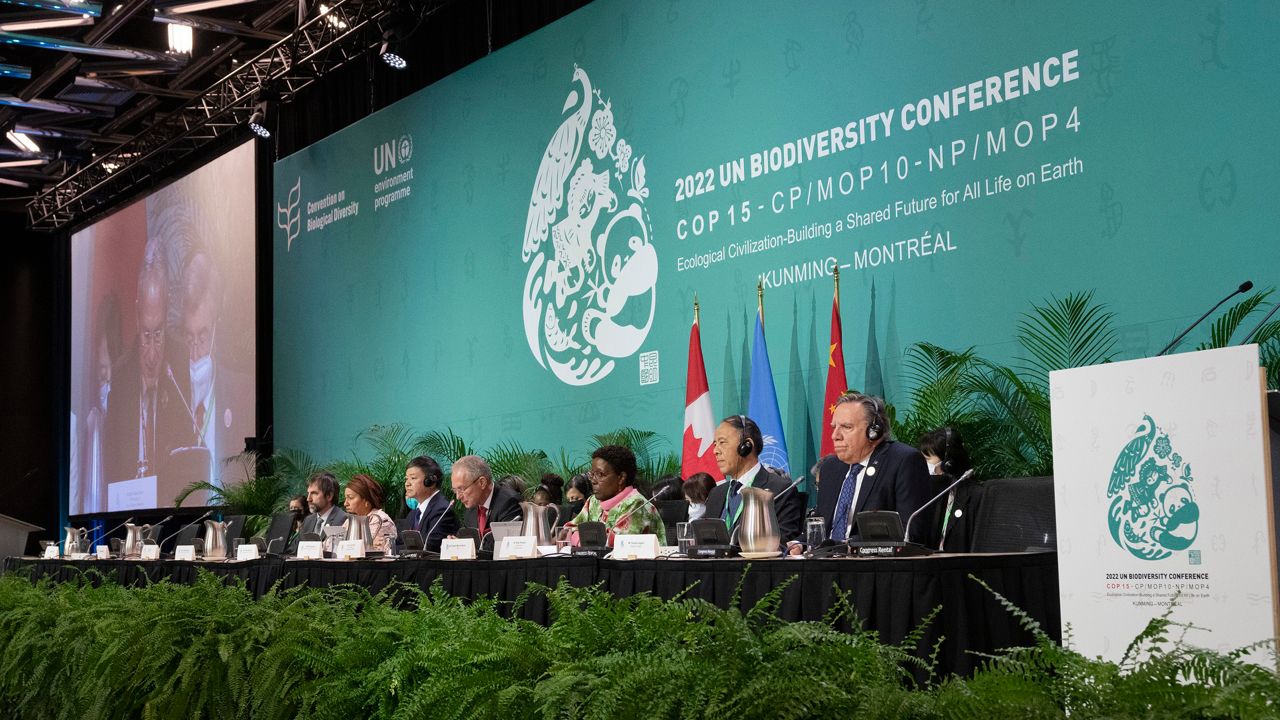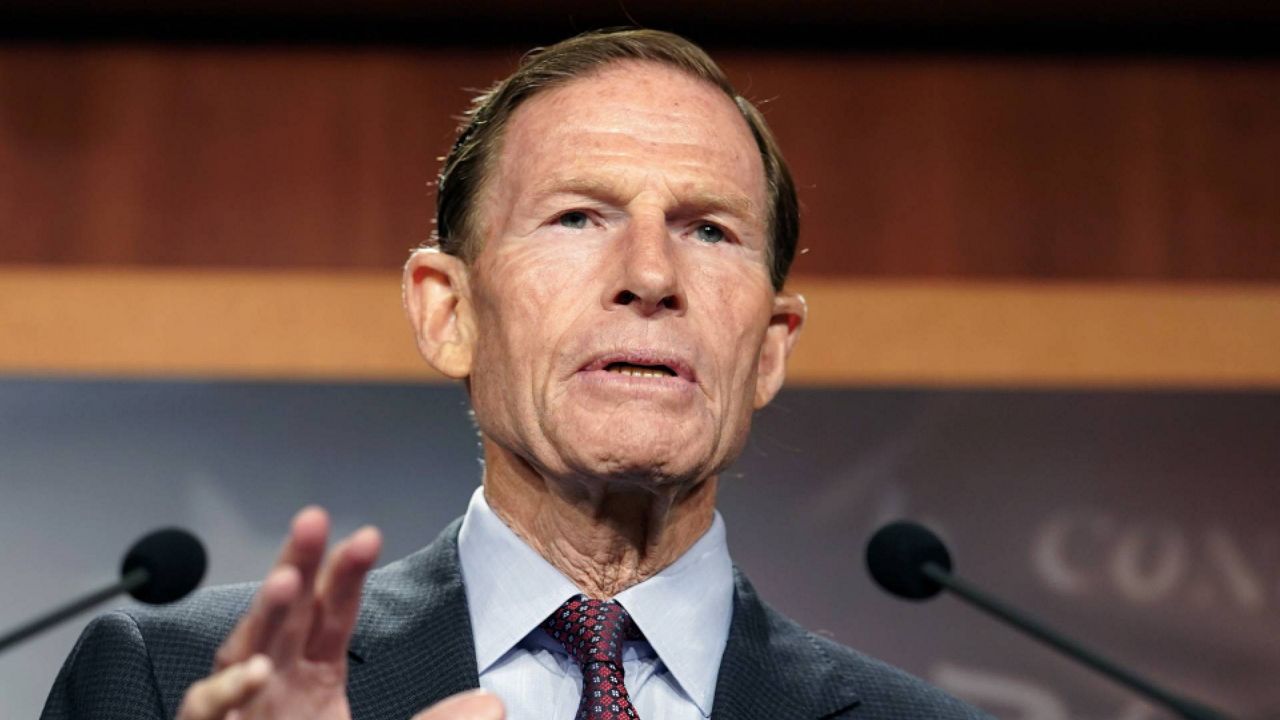After weeks and weeks of negotiations, The White House has released a framework for President Biden's long-awaited social spending and climate change package.
“Today I’m pleased to announce that after months of tough and thoughtful negotiations, I think we have … I know we have an historic economic framework," Biden said of the measure, which contains $1.75 trillion of social services and climate change programs the White House believes can pass the 50-50 Senate
What You Need To Know
- President Joe Biden traveled to Capitol Hill to pitch House Democrats on a dramatically scaled back domestic policy package
- The bill is now at $1.75 trillion and without a paid family leave program and other priorities, but it's still a sweeping proposal with new health care, free-prekindergarten and climate change programs
- Speaking about his economic agenda from the White House Thursday after his meeting with House Democrats, Biden called the bill "historic" and touted its investments in climate change and other measures
- The president has wanted to announce at least the framework of a deal before departing later Thursday on global summits
The full legislative text of the bill was released later in the day ahead of a scheduled House Rules Committee hearing on the bill Thursday afternoon.
Shortly after unveiling the bill Thursday morning, the president headed to Capitol Hill to make the case to House Democrats for the scaled-back domestic policy package.
Biden is eager to have a deal in hand before he departs later in the day for global summits, but the revised new package is losing some of Democrats' top priorities as the president's campaign ambitions make way for the political realities of the narrowly divided Congress.
Biden, speaking to reporters before heading to the Capitol, said that it was a "good day" and was confident he had enough progressive support to pass the bill.
When asked if Sen. Bernie Sanders, the chair of the Senate Budget Committee and a leading progressive voice in the caucus, was on board with the plan, Biden said "everybody’s on board."
According to sources familiar with the meeting, Biden emphasized how crucial the coming days will be for his presidency, as well as Democrats' chances in the 2022 midterms.
"I am back here to tell you that we have a framework that will get 50 votes in the United States Senate," Biden reportedly said, but emphasized that "I need your votes."
"We badly need a vote on both of these measures," Biden said, per sources familiar with his remarks. "I don’t think it’s hyperbole to say that the House and Senate majorities, and my presidency, will be determined by what happens in the next week."
In his meeting with lawmakers at the Capitol, Biden said he wanted progress in hand when he arrives in Rome for a global summit to show world leaders, including those in Russia and China, that democracies still work, according to those attending the private meeting.
“We are at an inflection point,” Biden said. “The rest of the world wonders whether we can function.”
Biden “asked for a spirited enthusiastic vote on his plan," according to Rep. Richard Neal, D-Mass., the influential head of the House Ways and Means committee. And twice in the meeting, Democratic lawmakers rose to their feet and started yelling, “Vote, vote, vote,” according to Rep. Gerald Connolly, D-Va..
"I think we're going to be in good shape," Biden said after leaving the meeting with lawmakers.
What's in the bill? Free pre-Kindergarten for all youngsters, expanded health care programs — including the launch of a $35 billion new hearing aid benefit for seniors on Medicare, closing the Medicaid gap to allow millions of uninsured Americans to get coverage and an expansion of the Affordable Care Act — and roughly $550 billion to tackle climate change.
The hearing benefit is a major win for progressives, including Sen. Sanders, who championed the provision, but his proposals to expand Medicare to cover dental and vision coverage were cut.
There's also an extension of the Child Tax Credit, a popular provision put in place in President Biden's COVID rescue bill, the American Rescue Plan, and child care provisions.
Biden said Thursday at the White House that the expanded Child Tax Credit is a "middle class tax cut for parents."
"We're extending that for another year," Biden said. "This will help cut child poverty in half next year, according to the experts."
It also sets aside $100 billion "to reform our broken immigration system," though it caveats that those reforms will be "consistent with the Senate’s reconciliation rules," though it's unclear what that means.
Taking shape after months of prolonged negotiations, the White House cast the overall package as the largest-ever investment in climate change and the biggest improvement to the nation’s healthcare system in more than a decade.
Progressive priorities like paid family leave and efforts to lower prescription drug pricing are now gone entirely from the package.
One point of emphasis added by the White House: The proposal would be fully paid for, thanks to a number of provisions, including a new 5% surtax on income over $10 million a year, instituting a new 15% corporate minimum tax, and rolling back some of the Trump administration’s 2017 tax cuts, along with stepped-up enforcement of tax-dodgers by the IRS.
"Combined with savings from repealing the Trump Administration’s rebate rule, the plan is fully paid for by asking more from the very largest corporations and the wealthiest Americans," the White House wrote in a statement. "The 2017 tax cut delivered a windfall to them, and this would help reverse that—and invest in the country’s future. No one making under $400,000 will pay a penny more in taxes."
The measure honors President Biden's campaign promise of no new taxes for those making less than $400,000.
"I can’t think of a single time when the middle class has done well that the wealthy haven’t done very well," Biden said at the White House on Thursday, blasting the theory of "trickle-down economics," which the president said "has always failed us."
Biden made remarks from the White House about the package, as well as a related $1 trillion bipartisan infrastructure plan, after his meeting on Capitol hill Thursday, before departing for Europe to attend global summits.
"No one got everything they wanted, including me," Biden said in his remarks. "But that’s what compromise is, that's consensus. And that's what I ran on. I've long said compromise and consensus are the only way to get big things done in a democracy."
"Somewhere along the way, we stopped investing in ourselves, investing in our people," Biden said of the need to invest in infrastructure and education. "America is still the largest economy in the world, the most productive workers, the most innovative minds in the world. But risk losing our edge as a nation."
"We can't be competitive in the 21st century global economy if we continue this slide," Biden said after citing a World Economic Forum report which ranks the U.S. as 13th in infrastructure.
"These are not about left versus right, or moderate versus progressive, or anything else that pits Americans against one another," Biden said of his proposals. "This is about competitiveness versus complacency. Competitiveness versus complacency. It's about expanding opportunity, not opportunity denied. This is about leading the world, or letting the world pass us by."
"If we make these investments, there will be no stopping the American people or America," Biden said. "Let's get this done."
Biden's bill also carries with it the support of two key Democratic heavyweights: Former Secretary of State and 2016 presidential candidate Hillary Clinton, and his old boss, former President Barack Obama.
"The president’s Build Back Better framework would be transformative for families and the middle class as a whole," Clinton, a staunch advocate for programs related to families, women and children for decades, wrote on Twitter. "It includes the largest investments in children and caregiving in generations."
"In a country as large and diverse as ours, progress can often feel frustrating and slow, with small victories accompanied by frequent setbacks," Obama wrote in a rare public statement. "But once in a while, it’s still possible to take a giant leap forward. That’s what the Build Back Better framework represents."
"The fight continues, but today’s landmark agreement is an important step on our long journey to live up to our highest ideals," Obama said.
Democrats' disputes over the big domestic policy bill has held up passage of a separate $1 trillion package of road, broadband and other infrastructure projects. But Biden made the push to send both over the “finish line.”
Applying pressure, House Speaker Nancy Pelosi announced a Thursday committee hearing to spur the Biden package along toward a full House vote, though timing remained uncertain. Pelosi did, however, say that she wants the $1 trillion bipartisan infrastructure bill passed by the time President Biden lands in Rome later Thursday as part of his European trip, and Democrats began whipping votes for the Senate-passed measure after Biden's visit to the Capitol.
"The President has asked for our vote today," Pelosi said, according to sources familiar with her remarks. "When the President gets off that plane we want him to have a vote of confidence from this Congress."
"This President has been a better friend to House Democrats than any other president," Pelosi said of Biden, adding: "In order for us to have success, we must succeed today."
The $1 trillion bill provides funding for roads, bridged, broadband and other public works projects. It passed the Senate with widespread bipartisan support over the summer, and Democratic leaders have promised to pass both bills in tandem in an attempt to appease both moderates and progressives in the caucus.
With a razor-thin House majority and an evenly divided Senate, Biden needs all Democrats’ support with no votes to spare. An administration official said that the president will defer to Speaker Pelosi on the timing of the bills, but Biden's message to the caucus on Thursday will be to pass the bills whenever they come up, citing the stakes for benefitting American families.
Rep. Pramila Jayapal, D-Wash., the chair of the progressive caucus, said that showing the new framework "will show tremendous momentum," but her members "want to see the actual text because we don’t want any confusion and misunderstandings."
Jayapal described Biden's presentation in the meeting as "impressive," but clarified that the president "did not ask for a vote" on the Bipartisan infrastructure bill Thursday, adding: "The speaker did, but he did not. He said he wants votes on both bills.”
Jayapal said a vote on the infrastructure bill Thursday is "logistically possible," but wasn't clear if enough progressives would support it.
White House officials met at the Capitol with moderate Sens. Joe Manchin, D-W.Va., and Kyrsten Sinema, D-Ariz., two holdout senators who now hold enormous power in the evenly divided chamber, essentially deciding whether or not Biden will be able to deliver on the Democrats’ major campaign promises.
Sinema, for her part, signaled support for the framework in a statement Thursday.
"After months of productive, good-faith negotiations with President Biden and the White House, we have made significant progress on the proposed budget reconciliation package," Sinema wrote. "I look forward to getting this done."
When asked if he supports the framework, Manchin said that "this is all in the hands of the House right now."
"I’ve worked in good faith, and I look forward to continuing to work in good faith, and that is all I have to say today," he added.
Manchin, when asked to clarify his position on the framework later Thursday, said again that he has "been dealing in good faith and I will continue to deal in good faith" but needs to see the text of the bill first, echoing similar claims by progressives.
"We haven’t seen the text yet," Manchin said. "Everyone has to see it. I don’t think anybody could say they could support it until they see the text."
Sanders said that the framework "has some major gaps in it" and added that he "wants to see it improved," specifically noting he wants to add more language pertaining to Medicare expansion and prescription drug reform, but also added that it's the "most consequential bill since the 1960s."
Sanders added that he thinks " the House should not be voting for an infrastructure bill unless they see very clear language and know that there are 50 senators on board, whatever the agreement may be."
"This is by far the most significant piece of legislation passed in the world to deal with climate," Bernie said of the Build Back Better framework. "It will cut childhood poverty very, very significantly, expand Medicare, build affordable housing."
"So this is a very big deal," he said, adding: "I want to see it made even stronger."
Leading progressive Sen. Elizabeth Warren of Massachusetts said repeatedly that she is "not commenting" on the framework proposal, but urged the passage of both bills in tandem.
"It’s the same answer it’s always been," Warren said. "There’s one big package here with multiple votes. It’s important all the pieces go forward together."
A Sunday deadline loomed for approving a smaller, bipartisan roads-and-bridges infrastructure bill or risk allowing funds for routine transportation programs to expire.
The Associated Press contributed to this report.









